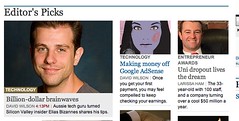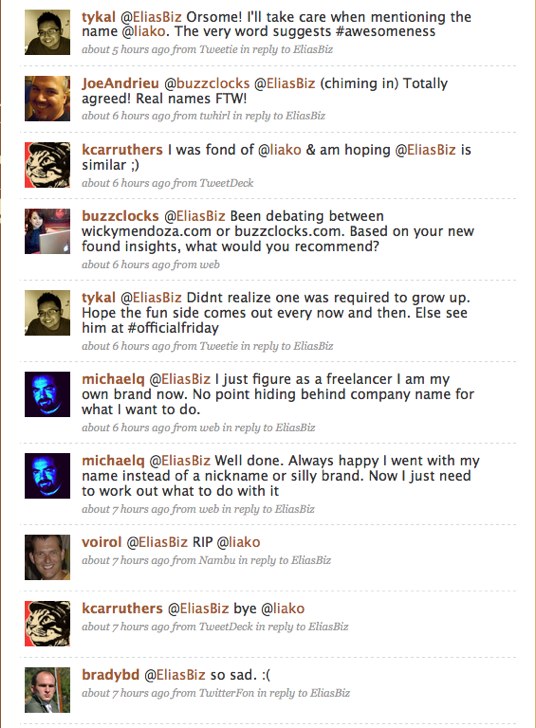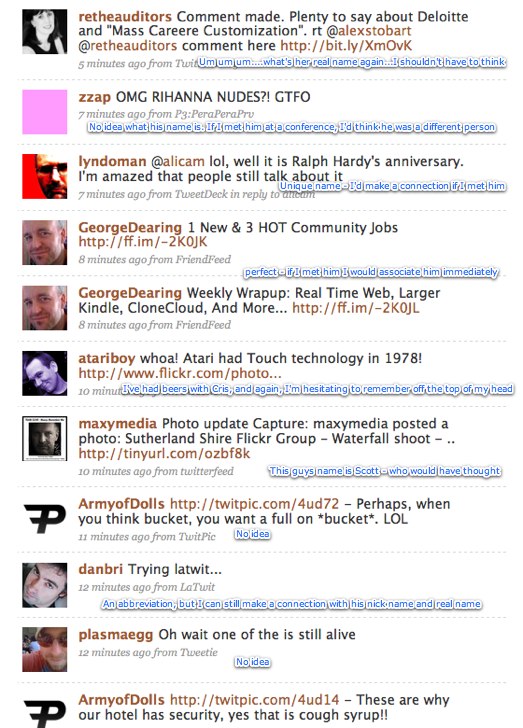Below is a podcast I recorded two days ago on Tuesday 23 June 2009 around 1200 UTC. For your benefit, I’ve attempted to transcribe the conversation as best as possible.
[display_podcast]
[Time=00:00] Hi my name is Elias Bizannes and I have done a podcast with an Iranian, who has grown up and still lives in Iran, as a way of trying to create some clarity into the situation that we’re seeing currently in Iran. A bit of background ‚Äì in 2005 I went traveling around the world, and one of the countries I visited was Iran. I spent about ten days in this beautiful country – exploring it ‚Äì and I really got a unique insight into the place. Since I heard about the issues hearing about the issues in Iran, I reached out to some friends of mine, worried that they might have been hurt themselves. And I finally got a response ‚Äì and as I was hearing about the things that are happening, I thought it might be interesting to share that information to the rest of the world ‚Äì because there is a lot of speculation and I think people are misunderstanding a lot of the events that are happening. So hopefully this will give you a bit of insight. If you have any other questions,¬† or if you would like me to get some further clarity, feel free to contact me. You can visit my personal website eliasbizannes.com
[1:08] So let’s now tune into my friend, who’s identity can’t be revealed, sitting in Iran right now.
[1:17] Are there protests happening outside of Tehran? Is there widespread discontent with the population?
I‚Äôm not living in Tehran, I‚Äôm living in a centred city of Iran ‚ÄúKashan‚Äù. There are not big rallies here, and the protests here are not widespread. Y‚Äôknow people here are much rural people and living in villages. And y‚Äôknow¬† – people that are a low level of thinking, there not so much student, not so much talented and open-minded people here. Y‚Äôknow, they’re public people in here.¬† But inside of the university of Kashan – there are so – much rallies and protests against the government. And the first day after the election results, the boys and girls in here staged rallies and they canceled the exams ‚Äì even the exams that they are holding. And they took the papers from the students, and they canceled the whole exam. And it had a very tough reaction from the security of the university ‚Äì and I heard there were some security forces outside the university and they were determined to use tough action against the students if they stepped out of the university. And there were some protest continuing at the university for three days. People were wearing black clothes, in mourning of those youths killed in Tehran and Esfahan. And they find some candles‚Ķ
[3:35] Are people being killed in Esfahan as well? Because what we are hearing in the West, is that all the protests are happening in Tehran. Has there been a lot of…
Yeah yeah. I hear from a friend of mine in Esfahan that there were some rallies at Esfahan university and there were some bombings in there. And they – students I don’t know if students or some people else – they fired the amphitheatre of Esfahan university of technology. There were broken windows and this situation there was so much much worse than here.  And the university of Esfahan is completely off these days. But, in my university, the exams are holding, but in the University of Tehran and the University of Esfahan, the exams are completely off.
[4:40] Yeah right. The situation is that everyone thinks the election was rigged. What makes people think it is. Has there been evidence or people just think it? Why do people think it has been rigged?
Well, y’know the majority of people that I confirmed, they don‚Äôt actually think that actually Mr Mousavihas actually won the election. They think that Mr Ahmadinejad has won, but not with the huge margin that they say. Y‚Äôknow, they want to rig the election because Mr Khatami won 21 million votes and they wanted to break his record by Mr Hashemi. They wanted to show people that Mr Ahmadinejad is more popular than him.¬† Y‚Äôknow, students and people ‚Äì they were saying that the people around them ‚Äì they were not seeing the villages ‚Äì y‚Äôknow inside the cities. They were thinking it was just themselves that were voting.¬† I think that Mr Ahmadinejad has won, but not with this huge margin. Maybe the election might be, is going to be next level, and Mr Ahmadinejad I don‚Äôt think he won the 50% plus one votes. Alright?
[6:24] Yeah ok. So from what I understand also is that people don’t want to completely overthrow the government and have another revolution.  They just want a better government.  Is that true?
Yeah – yeah, not concurring that this situation is 1979. The notion that the people don’t want a huge change in the system. The majority of people they do believe in the mullahcracy in Iran and the governing mullahs, they do believe in them and they do believe in the Ayatollah and they do believe in the in the fundamentals of the Islamic Republic, which are the government of the clergy men – Islamic clergymen. They just want their votes back, and they expected Mr Mousavi to change the situation Mr Ahmadinejad made in foreign affairs and in internal affairs they feel a huge mess, and I can see so much disappointment in the face of the people here because of this situation Mr Ahmadinejad has made. And they just wanted a change in the situation, changing the way in treating the world and the way in treating the people inside the country. They were tired of not being honest, tired of the legitimacy of the government, and they were tired of a government which is not straight forward to people and lying to people.  So I think people want big change Рalright…
[8:22]…And what do people think of Musavi and his backer Rafsanjani.  What are the perceptions of the public to those people?
Mr Mousavi is not a hero.  Of course, then he was not a hero, but now he’s a hero.  No – he is a person which was so popular to Mr Khomeini and he was so close to him and one of the people who had a very huge role in the victory of the Islamic Republic. He’s someone inside the system, and he’s not come outside of the system to change it – he’s one of them. Actually, before these protests people said he was one of them – but when he showed so much courage and so much bravery in behaving and consulting in these situations in Tehran – he didn’t push back and he didn’t take down the protesters – and encouraged them to more and more protest.  They now think he is a very brave man; he’s not one of them – he’s come to change the situation.
About Mr Rafsanjani – I know, the people were not backing Mr Rafsanjani in his presidential period, which was for eight years.  And people hated him Рand in the previous election, they think that anyone but Mr Rafsanjani that was competing against Mr Ahmadinejad, he would have won the election. But because of Rafsanjani, Mr Ahmadinejad won, and whomever was in front of Ahmadinejad was losing – er, was winning the election but Mr Rafsanjani. But after that, people saw lots and lots of criticism from Mr Rafsanjani of Mr Ahmadinejad, they think he changed his behaviour, and when he supported Mr Mousavi – I’m not saying that people are now a fan or supporter of Mr Rafsanjani – but people think that he’s changed. But, they hate him anyway right now, but not as much as before. His family – people believe, there’s so much evidence about his families financial corruption in the country – people are always talking about his daughter, his boys Рand their corruption.
[12:10] So, what’s happening right now? What are you seeing around you? Are there people all over the streets, police that are restricting movements? Have they cut down the Internet? What are you seeing right now?
Around me, which are students of the university,  I can see so much disappointment in their faces about their future. Lots of my friends and lots of students here are determined to learn English, and send applications to foreign universities overseas, and apply to different universities to get out of this country. They say they cannot endure this situation anymore. Me neither can endure this situation here, and I am determined to leave this country. And some people that are stuck to the system, they remain here – people that are not satisfied with the situation will leave the country. The intellectual people are among those who are not satisfied with the situation, and if these people leave the country, there will not be any more intellectual engineers, there are not more talented people in here, and I think it’s going to be a huge mess.
[13:55] What would people want to see though, to prevent this sort of drain of people leaving the country. What is it that people want to see to fix up Iran?
Well first of all, they want their votes back. They do believe that the election was rigged. And they do want Mr Mousavi to take back their lives, their votes…first of all, they don’t want Mr Ahmadinejad anymore. As you can see in Facebook and other Internet communities that there are some causes,  people are saying that he should go Рjust go – it is not important who should be our president, but it should not be him, should not be him…
[15:03] So if Ahmadinejad is taken out of government, would people be a lot happier?
You mean to crackdown this government?
Yeah – do they just want different people elected? Is that the only change they want?
Um – I think the majority of people want Mr Mousavi to become president. They do hope for a bright future and for positive changes in the country with Mr Mousavi – I think they just want Mr Ahmadinejad to resign and to be taken out of Iran politics.
[16:06] Something I want to get clarified and that would be interesting  Рthings like Facebook, Twitter and all that – have they been blocked by the government?
Yeah yeah, these whole websites are filtered. We can’t Facebook – YouTube – even I cannot access my Yahoo Messenger and mailbox Yahoo.com – and the situation is very tough. Even some websites inside the country which had permission from the Islamic Republic like cloob.com which is a website inside the country – they just don’t want the information to spread around the world. And with the pictures, they don’t want the world to see the violence. And some extremist websites and TV like we the voice of America, which are so extremist about pulling down this government. They are scared of truth! What the BBC says, y’know the BBC with no personal focus, just saying the truth – they re sending so much noises on satellite. Given the BBC has gone down, its broadcast on Hotbird start broadcasting on Telstar and Eutelsat?
[18:05] How are people organizing the protests? Is it through SMS and telephone calls then, if all these important websites are blocked, to organise?
The SMS was also cut down for about a week and a half. The mobile phones are ok, but not in Tehran. In Tehran, the whole telecommunications system was cut down and people were just using card phones, home phones – and they were spreading the news just on the internet via Yahoo messenger, especially some blogs – and people are using anti-censors and proxies to access the website and get the information about the place and the dates of the protests…but the SMS service was not on for a week and a half.
[19:26] What’s going to happen now?  What’s going to happen in the next few weeks? Do you think it’s going to be predictable, or do you think everything is unpredictable at the moment?
I think the protests have calmed down, and its not going to happen anything. And the tyranny of of Ayatollah Khamenei and Mr Ahmadinejad, is growing up more and more – and nothing is going to happen. But I think in the next few years, there is going to be more and more protests. And this government and this system, has not firm fundamentals and firm foundation anymore. People do not believe in the Ayatollah anymore…
(phonecall dropped out exactly at this point and podcast discussion ended)
(music)



